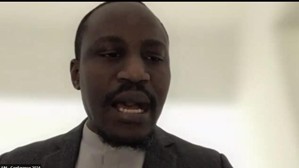Delivering the keynote on Media Credibility, Investigative reporting and artificial intelligence for the Amplify In-depth Media (AIM) Conference held on 8 and 9 December 2024, Tolu Ogunlesi, the immediate past special assistant to President Muhammadu Buhari on media and publicity and the Managing Partner of WoweMedia, painted a cautionary picture of humanity’s lack of readiness for a world increasingly driven by machine learning technology hammering out sophisticated contents. Laying the background for the conference on the first day, Ogunlesi likened the surge in the use and application of Artificial Intelligence (AI) to every field, including journalism, as “an aggressive tide reshaping the journalism and the media landscape”. Citing the unfortunate phenomenon of deepfakes in both audio and visual forms, he stated that the interest of journalists, especially investigative reporters and media resource centres, should be to come up with and invest in solutions that enable them to mitigate the real dangers posed by the malicious use of this technology.
Drawing from a recent controversy involving two global syndicates of investigative journalists accusing each other of government influence, he warned media practitioners sternly against credibility risks amid scandals and AI challenges. Specifically, he stated that “journalists cannot afford to lose the trust of their audience, particularly in their role as watchdogs tasked with holding power brokers accountable and exposing unethical practices within society”. Ogunlesi further urged journalists to remain above reproach by embracing a model of complete transparency, detailing their funding sources, the conditions attached, and whether AI tools were utilised in their reporting. He stressed the importance of accountability to their audience as the cornerstone of credible journalism. While delivering his unequivocal admonition on the profession’s critical responsibilities, Ogunlesi acknowledged the global struggle to integrate machine learning models of AI into journalism. He admitted that, despite its potential to cause disruptions and negative societal consequences, AI has brought and continues to bring significant benefits to the field. He suggested that this dual-edged nature of AI requires a thoughtful application to enhance journalistic practices while maintaining ethical standards.
He believed that humans are ill-equipped for an era in which machines churn out highly sophisticated content with an ever-expanding influence on daily life and decision-making. Touching on the fragile state of media credibility, Ogunlesi described it as a “cracked mirror” reflecting the challenges of the information age, exacerbated by the rapid adoption of AI-powered tools and machine learning models. He further underscored the critical need for media professionals, particularly investigative journalists, to uphold the standard of unquestionable credibility, giving no room for doubts, as this will ensure that their reportage is unimpeachable.
Tolu Ogunlesi later joined Victoria Bamas, Editor at the International Centre for Investigative Reporting (ICIR), and Jeff Kelly Lowenstein, Executive Director of the Center for Collaborative Investigative Journalism (CCIJ), in a panel session moderated by Nabilah Usman, Head of Programmes at Radio Now 95.3 FM and conference host. Responding to questions, Ogunlesi advocated for media independence and ethical innovation for sustainability while encouraging journalists to uphold higher standards in 21st-century information warfare.
The conference, which the Wole Soyinka Centre hosted for Investigative Journalism (WSCIJ), is the 4th edition and had media stakeholders and experts in attendance. Watch here.


